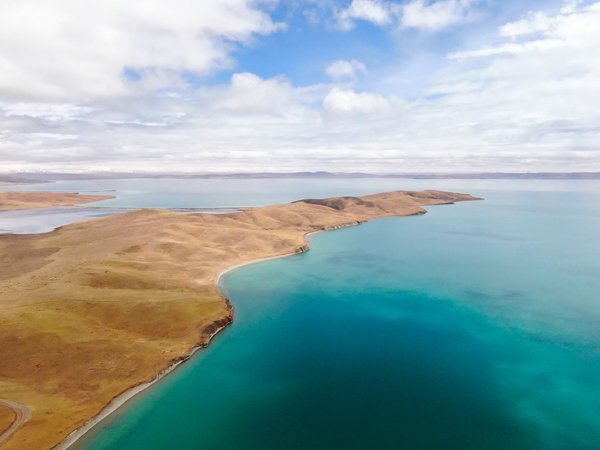Xi Story: Resolute Efforts at Protecting China's Mother Rivers
 |
| This aerial photo taken on May 25, 2021 shows a view of Ngoring Lake at the Yellow River source area of the Sanjiangyuan National Park in northwest China's Qinghai Province. [Xinhua/Li Zhanyi] |
BEIJING, March 22 (Xinhua) — Wednesday marks the 31st World Water Day, and this year's theme is "Accelerating Change."
It also marks the start of China Water Week launched to raise public awareness of water resource protection.
Water is crucial for a nation's development, and China is no exception. Under the leadership of Xi Jinping, general secretary of the Communist Party of China (CPC) Central Committee, concerted efforts have been made in water-related disaster prevention, water resource conservation, protection and restoration of the aquatic ecosystem, and water environment governance.
These endeavors have resulted in remarkable achievements and transformative changes in the water conservation sector, emblematic of China's progress in the new era.
The Yellow River and Yangtze River are regarded as the "mother rivers" of the Chinese nation, with the Yangtze, which spans an impressive 6,363 km, being the third-largest river in the world. Yet, massive floods along these rivers used to cause immense devastation to lives and properties. In response, the Chinese people have long relied on water management as a means of mitigating risks such as floods, water scarcity, and uneven distribution of water resources. These efforts reflect the ingenuity and resilience of the Chinese people throughout history.
Major hydroelectric dams such as the Three Gorges and Baihetan have been built on the Yangtze to cope with floods and provide a stable stream of green power for the world's second-largest economy.
Xi has undertaken extensive inspections along the upper, middle, and lower reaches of the Yangtze River, spearheading green development initiatives within the Yangtze River Economic Belt. In a significant move to protect aquatic biodiversity, a 10-year fishing ban was implemented in the pivotal waters of the Yangtze.
"The aquatic biodiversity of the Yangtze River cannot be lost in the hands of our generation," said Xi during an inspection tour in east China's Anhui Province in August 2020.
This stern warning came amidst sweeping efforts for the restoration and preservation of the ecological health along the river, and the results of these efforts are evident in the recovery of aquatic resources in key areas. The population of finless porpoises, a barometer of water quality in the Yangtze River basin, has reached 1,249, up 23.42 percent from five years ago.
Zhang Bajin, who is tasked with taking care of porpoises in the Tongling River Dolphin National Nature Reserve in Anhui, said he hopes that with the consistent improvement of water quality, the porpoises will be able to roam freely in the Yangtze again.
Over the past decade, the concept of "lucid waters and lush mountains are invaluable assets," proposed by Xi, has emerged as a guiding principle in China's pursuit of green development. As a result, significant strides have been made in controlling water pollution and improving biodiversity across the country.
A key aspect of this progress has been the commitment of over 1.2 million officials, serving as river and lake chiefs, who are dedicated to the conservation and management of water resources.
Over the past few years, Xi has also visited all nine provinces and autonomous regions along the Yellow River.
"The Yellow River is our mother river, and conservation is the precondition. We must make unremitting efforts to protect it," said Xi during an inspection visit to the estuary of the Yellow River in east China's Shandong Province in October 2021.
During springtime, flocks of migratory birds soar over the Yellow River delta national nature reserve in Shandong, where the river meets the sea.
"We have built channels and sluices to boost water resources at the wetland. This has resulted in a significant surge of birdlife, which makes it difficult for me to distinguish between the many bird species," said Wang Lidong, an engineer who works at the wetland restoration project of the nature reserve.
China will continue to pursue a green development path featuring harmony between humanity and nature.
According to the report to the CPC's 20th National Congress, the country will make concerted efforts to improve aquatic environments, water resources and aquatic ecosystems, strengthen the ecological conservation of major rivers, lakes and reservoirs, and generally eliminate black, malodorous water bodies in cities.
(Source: Xinhua)
Please understand that womenofchina.cn,a non-profit, information-communication website, cannot reach every writer before using articles and images. For copyright issues, please contact us by emailing: website@womenofchina.cn. The articles published and opinions expressed on this website represent the opinions of writers and are not necessarily shared by womenofchina.cn.






.jpg)

 WeChat
WeChat Weibo
Weibo 京公网安备 11010102004314号
京公网安备 11010102004314号